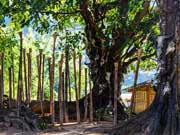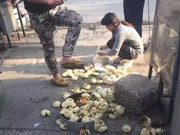

Statute of Confucius
My 10-month media fellowship in China would have been incomplete without visiting the site of China’s rich culture surrounding Confucius.
Anyone who passes through educational processes, one way or the other, learns or hears about Confucius. Confucius was an influential Chinese philosopher, teacher and political figure known for his popular aphorisms and for his models of social interaction.
True to my wish, our (28 African journalists on the fellowship) host, China Public Diplomacy Association (CPDA), through China Africa Press Center (CAPC), took us to this rich cultural site in Qufu, Shandong Province, East China, as part of our visit to the province on October 16-21, 2016. Qufu, the capital of the one-time state of Lu in the Spring and Autumn Period and of the first 24 historic and cultural cities designated by the State Council, is the hometown of Confucius.
Here on October 17, 2016, we visited the Confucius Compound, consisting of the temple, mansion and cemetery, which was listed by UNESCO in 1994 as the World Cultural Heritage.
Kevin Zhong, a young resident of Qufu, guided our two-hour tour of the site. Point-by-point, Klevin explained through megawatt-powered megaphones distributed by the site caretakers and glued to our ears as the usual way of handling large crowds of visitors including local and international tourists. Our historic journey began at the Confucius Temple, to the Kong Family Mansion and climaxed at the Cemetery-what a wonderful experience!!
The Temple of Confucius
Due to the unique importance of Confucius (Kong Qiu, 551-479 BC) to Chinese history and culture, his memorial temple has grown, over the past 2,000 years, into a compound rivaled only by the Forbidden City in dignity and honor. The building seen here is the Kuiwen Pavilion, a seven-bay library hall that was first built in 1018 (Song dynasty), rebuilt in 1191 (Jin dynasty), and rebuilt in 1500 (Ming dynasty). In its present (Ming dynasty) form it is a seven-bay, three-storey hall with a surrounding porch, hidden mezzanine, and a double-eave roof.
Dacheng Dian
The Great Achievement Hall (Dacheng Dian) is the main hall of the temple, located in the 6th courtyard. The hall is seven-bay wide, extended by the porch to nine-bay total. During the Qing dynasty, the seasonal sacrifices to Confucius himself lasted five days and involved the participation of about 1,000 people. Sacrifice was also offered to Confucius' wife, who was given her own temple in the courtyard behind this one.
The Kong Family Mansion was the historical residence of the direct descendants of Confucius. From the mansion, the family tended to the Confucian sites in Qufu and also governed the largest private rural estate in China. The Kong family was in charge of conducting elaborate religious ceremonies on occasions such as plantings, harvests, honoring the dead, and birthdays.
 |

 Who Will Fit The Chinese Roles In Game Of Thrones?
Who Will Fit The Chinese Roles In Game Of Thrones? China's Hubei Shennongjia added to World Heritage List
China's Hubei Shennongjia added to World Heritage List Cute Dog At Fruit Stand Becomes Latest Internet Sensation
Cute Dog At Fruit Stand Becomes Latest Internet Sensation Top 10 livable Chinese cities
Top 10 livable Chinese cities The last primitive tribe in China
The last primitive tribe in China China's first intelligent security robot debuts in Chongqing
China's first intelligent security robot debuts in Chongqing A Total of 3,552 Subscribers Vanish In Two Days; YouTube Closes All Doors to Users’ Inquiries
A Total of 3,552 Subscribers Vanish In Two Days; YouTube Closes All Doors to Users’ Inquiries Out of this world! Futuristic UFO-shaped yacht has its own garden and a stunning underwater viewing deck
Out of this world! Futuristic UFO-shaped yacht has its own garden and a stunning underwater viewing deck An old tea house in Chengdu
An old tea house in Chengdu Furious Customer Crushes All the Buns from Vendor Just Because He Was Given the Wrong Flavor
Furious Customer Crushes All the Buns from Vendor Just Because He Was Given the Wrong Flavor